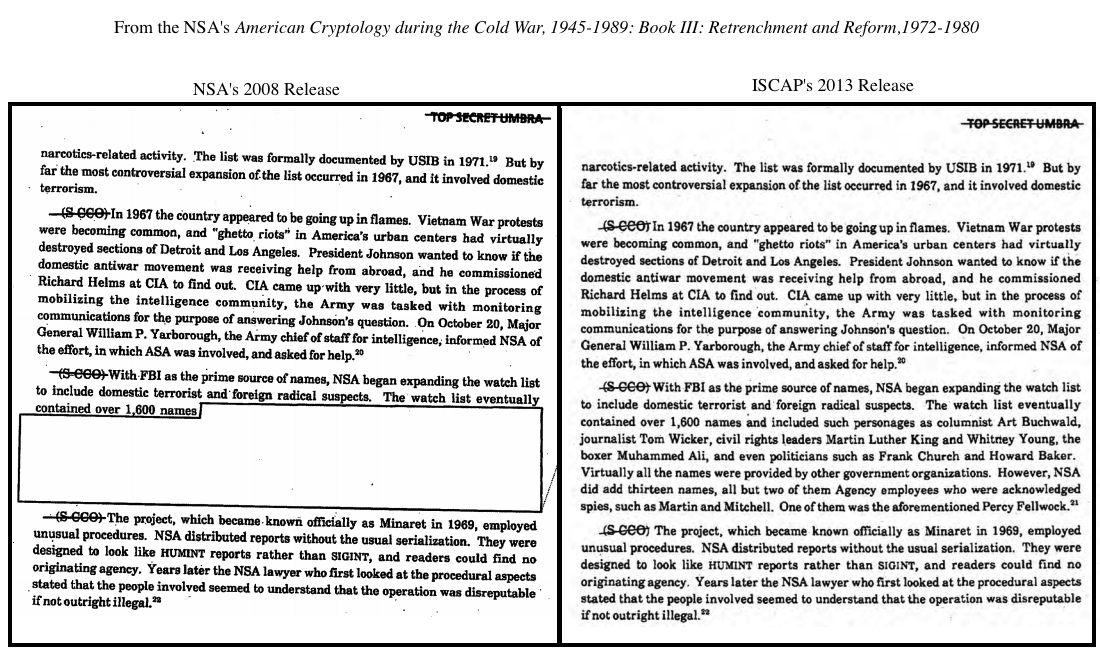Spy Chief James Clapper Wins Rosemary Award: Worst Open Government Performance of 2013
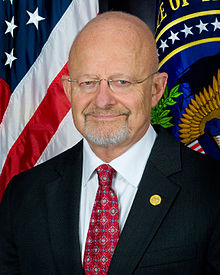
Washington, DC, March 24, 2014 – Director of National Intelligence James Clapper has won the infamous Rosemary Award for worst open government performance in 2013, according to the citation published today by the National Security Archive at www.nsarchive.org. Despite heavy competition, Clapper’s “No, sir” lie to Senator Ron Wyden’s question: “Does the NSA collect any type of data at all on millions or hundreds of millions of Americans?” sealed his receipt of the dubious achievement award, which cites the vastly excessive secrecy of the entire U.S. surveillance establishment.
The Rosemary Award citation leads with what Clapper later called the “least untruthful” answer possible to congressional questions about the secret bulk collection of Americans’ phone call data. It further cites other Clapper claims later proved false, such as his 2012 statement that “we don’t hold data on U.S. citizens.” But the Award also recognizes Clapper’s fellow secrecy fetishists and enablers, including:
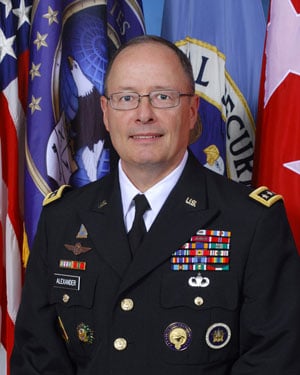 Director of the NSA General Keith Alexander who submitted multiple entries for the Rosemary Award. (Photo credit: National Security Agency)
Director of the NSA General Keith Alexander who submitted multiple entries for the Rosemary Award. (Photo credit: National Security Agency)
- Gen. Keith Alexander, director of the NSA, for multiple Rose Mary Woods-type stretches, such as (1) claiming that the secret bulk collection prevented 54 terrorist plots against the U.S. when the actual number, according to the congressionally-established Privacy and Civil Liberties Oversight Board (PCLOB) investigation (pp. 145-153), is zero; (2) his 2009 declaration to the wiretap court that multiple NSA violations of the court’s orders arose from differences over “terminology,” an explanation which the chief judge said “strains credulity;”and (3) public statements by the NSA about its programs that had to be taken down from its website for inaccuracies (see Documents 78, 85, 87 in The Snowden Affair), along with public statements by other top NSA officials now known to be untrue (see “Remarks of Rajesh De,” NSA General Counsel, Document 53 in The Snowden Affair).
- Robert Mueller, former FBI director, for suggesting (as have Gen. Alexander and many others) that the secret bulk collection program might have been able to prevent the 9/11 attacks, when the 9/11 Commission found explicitly the problem was not lack of data points, but failing to connect the many dots the intelligence community already had about the would-be hijackers living in San Diego.
- The National Security Division lawyers at the Justice Department, for misleading their own Solicitor General (Donald Verrilli) who then misled (inadvertently) the U.S. Supreme Court over whether Justice let defendants know that bulk collection had contributed to their prosecutions.
- The same National Security Division lawyers who swore under oath in the Electronic Frontier Foundation’s Freedom of Information Act lawsuit for a key wiretap court opinion that the entire text of the opinion was appropriately classified Top Secret/Sensitive Compartmented Information (release of which would cause “exceptionally grave damage” to U.S. national security). Only after the Edward Snowden leaks and the embarrassed governmental declassification of the opinion did we find that one key part of the opinion’s text simply reproduced the actual language of the 4th Amendment to the U.S. Constitution, and the only “grave damage” was to the government’s false claims.
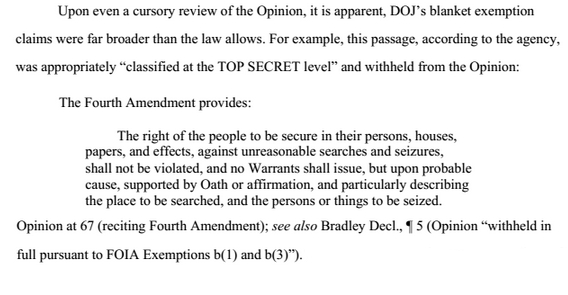
 Charlie Rose and President Obama. (Photo credit: Charlie Rose)
Charlie Rose and President Obama. (Photo credit: Charlie Rose)
- President Obama for his repeated misrepresentations about the bulk collection program (calling the wiretap court “transparent” and saying “all of Congress” knew “exactly how this program works”) while in effect acknowledging the public value of the Edward Snowden leaks by ordering the long-overdue declassification of key documents about the NSA’s activities, and investigations both by a special panel and by the Privacy and Civil Liberties Oversight Board.
The PCLOB directly contradicted the President, pointing out that “when the only means through which legislators can try to understand a prior interpretation of the law is to read a short description of an operational program, prepared by executive branch officials, made available only at certain times and locations, which cannot be discussed with others except in classified briefings conducted by those same executive branch officials, legislators are denied a meaningful opportunity to gauge the legitimacy and implications of the legal interpretation in question. Under such circumstances, it is not a legitimate method of statutory construction to presume that these legislators, when reenacting the statute, intended to adopt a prior interpretation that they had no fair means of evaluating.” (p. 101)
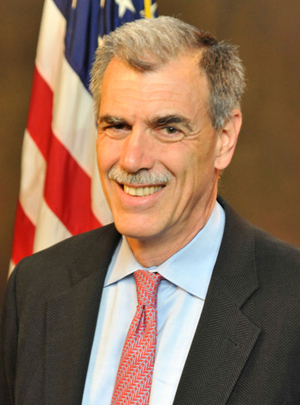
Solicitor General Donald Verrilli who misled the Supreme Court after his own National Security Division lawyers misled him. (Photo credit: Department of Justice)
The Emmy and George Polk Award-winning National Security Archive, based at the George Washington University, has carried out thirteen government-wide audits of FOIA performance, filed more than 50,000 Freedom of Information Act requests over the past 28 years, opened historic government secrets ranging from the CIA’s “Family Jewels” to documents about the testing of stealth aircraft at Area 51, and won a series of historic lawsuits that saved hundreds of millionsof White House e-mails from the Reagan through Obama presidencies, among many other achievements.
The Archive established the not-so-coveted Rosemary Award in 2005, named after President Nixon’s secretary, Rose Mary Woods, who testified she had erased 18-and-a-half minutes of a crucial Watergate tape — stretching, as she showed photographers, to answer the phone with her foot still on the transcription pedal. Bestowed annually to highlight the lowlights of government secrecy, the Rosemary Award has recognized a rogue’s gallery of open government scofflaws, including the CIA, the Treasury Department, the Air Force, the FBI, the Federal Chief Information Officers’ Council, and the career Rosemary leader — the Justice Department — for the last two years.
Rosemary-winner James Clapper has offered several explanations for his untruthful disavowal of the National Security Agency’s phone metadata dragnet. After his lie was exposed by the Edward Snowden revelations, Clapper first complained to NBC’s Andrea Mitchell that the question about the NSA’s surveillance of Americans was unfair, a — in his words — “When are you going to stop beating your wife kind of question.” So, he responded “in what I thought was the most truthful, or least untruthful, manner by saying ‘no.'”
After continuing criticism for his lie, Clapper wrote a letter to Chairman of the Senate Select Committee on Intelligence Dianne Feinstein, now explaining that he misunderstood Wyden’s question and thought it was about the PRISM program (under Section 702 of the Foreign Intelligence Surveillance Act) rather than the telephone metadata collection program (under Section 215 of the Patriot Act). Clapper wrote that his staff “acknowledged the error” to Senator Wyden soon after — yet he chose to reject Wyden’s offer to amend his answer.
Former NSA senior counsel Joel Brenner blamed Congress for even asking the question, claiming that Wyden “sandbagged” Clapper by the “vicious tactic” of asking “Does the NSA collect any type of data at all on millions or hundreds of millions of Americans?” Meanwhile, Steve Aftergood of the Federation of American Scientists countered that “it is of course wrong for officials to make false statements, as DNI Clapper did,” and that in fact the Senate Intelligence Committee “became complicit in public deception” for failing to rebut or correct Clapper’s statement, which they knew to be untruthful.
Clapper described his unclassified testimony as a game of “stump the chump.” But when it came to oversight of the National Security Agency, it appears that senators and representatives were the chumps being stumped. According to Representative Justin Amash (R-Mich), the House Intelligence Committee “decided it wasn’t worthwhile to share this information” about telephone metadata surveillance with other members of Congress. Classified briefings open to the whole House were a “farce,” Amash contended, often consisting of information found in newspapers and public statutes.
Even an author of the Patriot Act, Rep. Jim Sensenbrenner (R-WI), was broadsided by the revelation of the telephone metadata dragnet. After learning of the extent of spying on Americans that his Act unleashed, he wrote that the National Security Agency “ignored restrictions painstakingly crafted by lawmakers and assumed plenary authority never imagined by Congress” by cloaking its actions behind the “thick cloud of secrecy” that even our elected representatives could not breech.
Clapper recently conceded to the Daily Beast, “I probably shouldn’t say this, but I will. Had we been transparent about this [phone metadata collection] from the outset … we wouldn’t have had the problem we had.” The NSA’s former deputy director, John “Chris” Inglis, said the same when NPR asked him if he thought the metadata dragnet should have been disclosed before Snowden. “In hindsight, yes. In hindsight, yes.” Speaking about potential (relatively minimal) changes to the National Security Agency even the president acknowledged, “And all too often new authorities were instituted without adequate public debate,” and “Given the unique power of the state, it is not enough for leaders to say: Trust us. We won’t abuse the data we collect. For history has too many examples when that trust has been breached.” (Exhibit A, of course, is the NSA “watchlist” in the 1960’s and 1970’s that targeted not only antiwar and civil rights activists, but also journalists and even members of Congress.)
Director Clapper joins an undistinguished list of previous Rosemary Award winners:
- 2012 – the Justice Department (in a repeat performance, for failure to update FOIA regulations for compliance with the law, undermining congressional intent, and hyping its open government statistics)
- 2011- the Justice Department (for doing more than any other agency to eviscerate President Obama’s Day One transparency pledge, through pit-bull whistleblower prosecutions, recycled secrecy arguments in court cases, retrograde FOIA regulations, and mixed FOIA responsiveness)
- 2010 – the Federal Chief Information Officers’ Council (for “lifetime failure” to address the crisis in government e-mail preservation)
- 2009 – the FBI (for having a record-setting rate of “no records” responses to FOIA requests)
- 2008 – the Treasury Department (for shredding FOIA requests and delaying responses for decades)
- 2007 – the Air Force (for disappearing its FOIA requests and having “failed miserably” to meet its FOIA obligations, according to a federal court ruling)
- 2006 – the Central Intelligence Agency (for the biggest one-year drop-off in responsiveness to FOIA requests yet recorded).
ALSO-RANS
The Rosemary Award competition in 2013 was fierce, with a host of government contenders threatening to surpass the Clapper “least untruthful” standard. These secrecy over-achievers included the following FOI delinquents:
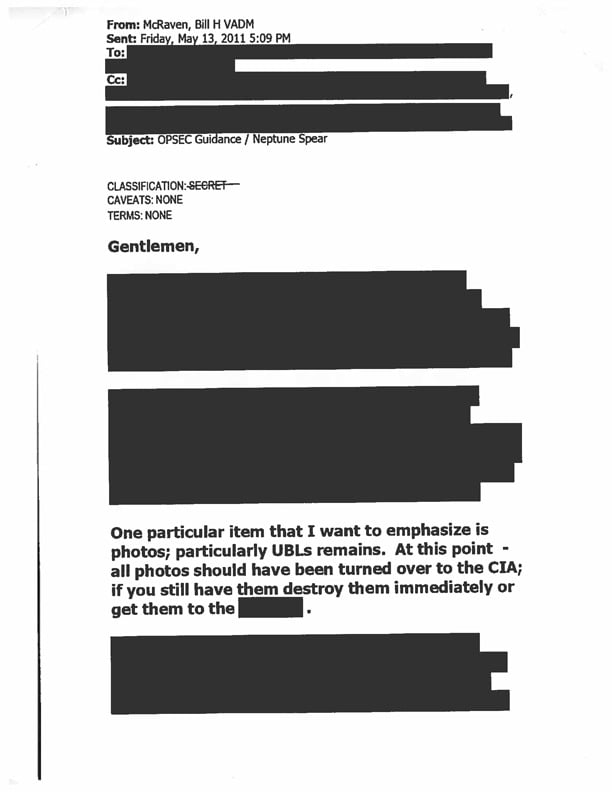 Admiral William McRaven memo from May 13, 2011, ordering the destruction of evidence relating to the Osama bin Laden raid. (From Judicial Watch)
Admiral William McRaven memo from May 13, 2011, ordering the destruction of evidence relating to the Osama bin Laden raid. (From Judicial Watch)- Admiral William McRaven, head of the Special Operations Command for the raid that killed Osama Bin Laden, who purged his command’s computers and file cabinets of all records on the raid, sent any remaining copies over to CIA where they would be effectively immune from the FOIA, and then masterminded a “no records” response to the Associated Press when the AP reporters filed FOIA requests for raid-related materials and photos. If not for a one-sentence mention in a leaked draft inspector general report — which the IG deleted for the final version — no one would have been the wiser about McRaven’s shell game. Subsequently, a FOIA lawsuit by Judicial Watch uncovered the sole remaining e-mail from McRaven ordering the evidence destruction, in apparent violation of federal records laws, a felony for which the Admiral seems to have paid no price.
- Department of Defense classification reviewers who censored from a 1962 document on the Cuban Missile Crisis direct quotes from public statements by Soviet Premier Nikita Khrushchev. The quotes referred to the U.S. Jupiter missiles in Turkey that would ultimately (and secretly) be pulled out in exchange for Soviet withdrawal of its missiles in Cuba. The denials even occurred after an appeal by the National Security Archive, which provided as supporting material the text of the Khrushchev statements and multiple other officially declassified documents (and photographs!) describing the Jupiters in Turkey. Such absurd classification decisions call into question all of the standards used by the Pentagon and the National Declassification Center to review historical documents.
- The Department of Justice Office of Information Policy, which continues to misrepresent to Congress the government’s FOIA performance, while enabling dramatic increases in the number of times government agencies invoke the purely discretionary “deliberative process” exemption. Five years after President Obama declared a “presumption of openness” for FOIA requests, Justice lawyers still cannot show a single case of FOIA litigation in which the purported new standards (including orders from their own boss, Attorney General Eric Holder) have caused the Department to change its position in favor of disclosure.


